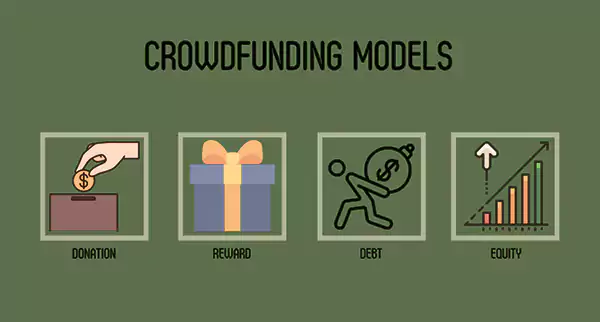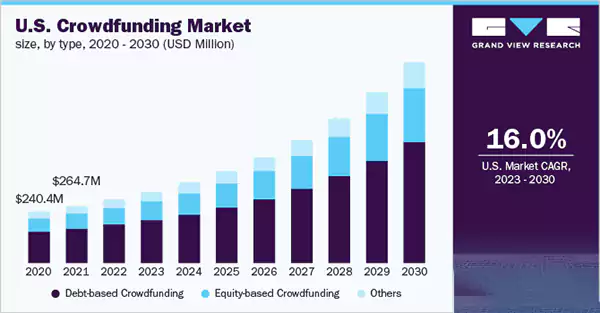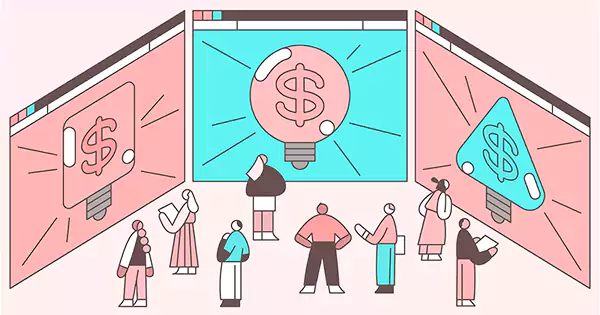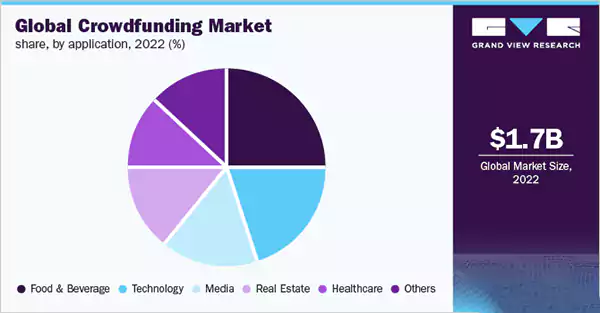
Key Takeaways
- Crowdfunding is a great source of gathering a small amount of money from a large number of people that ultimately ends up fueling your enterprise or plans.
- Artists are one of those people who greatly benefit from this form of fundraising, as now they do not have to search various enterprises to back their art pieces.
- If artificial intelligence gets integrated with crowdfunding platforms, its technology and algorithm can help various donors and seekers to connect with each other more effectively and efficiently.
Crowdfunding has revolutionized the way individuals and businesses raise funds for their projects and ideas. In recent years, with the advancements in technology, artificial intelligence (AI) has emerged as a powerful tool for enhancing strategies.
This article aims to provide a comprehensive study of its evolution with AI, highlighting its impact on various industries and exploring successful campaigns.

Crowdfunding, as the name suggests, involves funding a project or venture by raising small amounts of money from numerous people, typically via online platforms. It has become a popular alternative to traditional financing options, such as bank loans or venture capital.
Since its inception in the early 2000s, crowdfunding has grown rapidly, allowing individuals with innovative ideas to bring them to life. The concept of collective support has been around for centuries, but the advent of the internet and social media platforms has made it accessible to a global audience.
Crowdfunding has its roots in various historical practices of collective funding. In ancient times, communities would come together to support projects that benefited the entire group. This collective effort allowed individuals to pursue their dreams and create something meaningful for their community.
Fast-forward to the 18th century, and we see the emergence of a subscription-based model. This method involved people subscribing to a project or idea and providing financial support in exchange for rewards or benefits. One notable example is the publication of Charles Dickens’ novel “The Pickwick Papers,” which was funded through subscriptions from readers.
However, it wasn’t until the rise of the internet and the proliferation of social media platforms that crowdfunding truly took off. Websites like Kickstarter and Indiegogo paved the way for individuals to showcase their ideas and attract support from a global audience. This democratization of funding has revolutionized the way projects are brought to life.

Crowdfunding has had a significant impact on various industries, from creative arts to technology startups. It has democratized funding by providing a platform for anyone with a compelling idea to seek support directly from potential backers. This has resulted in increased invention and reduced barriers to entry.
In the creative arts industry, raising funds from the crowd has empowered artists, musicians, filmmakers, and writers to pursue their passions without the need for traditional gatekeepers. By directly connecting with their audience, creatives can fund their projects, build a loyal fan base, and maintain creative control over their work.
Speaking of technology startups, they have also benefited greatly. In the past, entrepreneurs had to rely on venture capitalists or angel investors to fuel their ventures. This often meant giving up a significant portion of ownership and control. With this model, startups can raise the necessary capital from a diverse pool of backers, retaining more autonomy and flexibility in their business decisions.
Moreover, projects that may have been deemed too niche or risky by traditional investors to find support, are now able to explore alternatives as well. This has led to a surge in innovation across several industries, as individuals with unique ideas can now find a platform to bring their visions to life.
Overall, crowdfunding has revolutionized the way projects are supported and has opened doors for individuals from all walks of life to pursue their dreams. Be it a creative endeavor or a groundbreaking startup, raising money through this way has provided a powerful tool for turning ideas into reality.

FACT: Did you know? In the United States of America, the crowdfunding scene is experiencing a massive growth with a 16% annual rate.
With the growth of crowdfunding, AI has emerged as a valuable tool in movements and improving the chances of success. Algorithms can analyze vast amounts of data, identify trends, and make predictions, enabling campaign creators to make informed decisions.
In the ever-evolving landscape of crowdfunding, the advent of Ethereum code offers a compelling narrative. Whereas it primarily revolves around pooling funds for startups and innovative projects, the investment decisions behind these projects can benefit from predictive analytics. Ethereum Code, with its lightning-fast data processing and research capabilities, brings a new layer of sophistication to these decisions.
For larger platforms that dabble in equity-based, especially, understanding market behaviors via Ethereum Code can help ascertain the potential returns and viability of projects. As we dive deeper into the union of the subject and artificial intelligence in this study, it becomes evident that the prowess of Ethereum Code systems can further enhance the efficacy and success rates of crowdfunded ventures.
AI can analyze historical data to identify patterns and factors that contribute to success. It can suggest optimal money-related goals, recommend the best timing for launching a campaign, and provide insights into target demographics. This data-driven approach can significantly increase the effectiveness.
Moreover, the algorithms can also analyze the performance of different campaign elements such as the video, description, and reward structure. By identifying the elements that resonate the most with potential backers, artificial intelligence can help creators optimize their content to attract more supporters.
By leveraging technologies like natural language processing and machine learning, platforms can improve user experience and personalize recommendations. AI-powered chatbots can handle inquiries, provide support, and assist in navigating the platform, enhancing engagement and trust.
Moreover, it can help programs identify and prevent fraudulent activities. By analyzing user behavior and transaction patterns, algorithms can detect suspicious activities and alert administrators, ensuring a safe and secure environment.
Plus, it can play a major role in post-campaign analysis. By analyzing the success factors of previous efforts, artificial intelligence can provide campaign creators with valuable insights and recommendations for future efforts. This iterative learning process can help creators continuously improve their strategies and increase their chances of success.
In conclusion, the emergence of AI in crowdfunding has revolutionized the way in which the whole process is optimized and executed. With its ability to analyze data, provide recommendations, enhance user experience, and detect fraudulent activities, it has become an indispensable tool for both creators and programs. As technology continues to advance, we can expect intelligence to play an even more significant role in shaping the future.
Kickstarter, one of the leading platforms, has embraced AI to enhance its success rates. Using algorithms, Kickstarter analyzes campaign data to identify projects with the highest potential and recommends them to potential backers. This targeted approach has led to numerous success stories and increased overall success rates.
Indiegogo, another prominent platform, has integrated technology to optimize its funding process. Indiegogo’s algorithm analyzes project data, user behavior, and trends to predict the likelihood of a campaign’s success. This enables creators to make data-driven decisions and increases their chances of reaching their funding goals.

The future of crowdfunding with AI looks promising. As technology continues to advance, it is expected to play a more significant role in campaigns. It is anticipated that this tech will enable personalized experiences, assist individuals in identifying target audiences, and even predict the success of the efforts before they are launched.
AI offers tremendous opportunities, but it is not without challenges. Privacy concerns, algorithm biases, and the need for transparent decision-making are some potential hurdles. However, by ensuring data ethics, addressing biases, and fostering transparency, these challenges can be mitigated.

Statistics: This data shows different shares in which the whole crowdfunding market is divided.
The integration of artificial intelligence with crowdfunding has transformed the way projects are funded. It has brought access to capital to a wider audience and empowered creators with data-driven insights. The evolution is set to continue, opening new doors for innovation and inclusivity.
AI has the potential to make it more inclusive by reducing bias and expanding the reach of campaigns. By analyzing user data and behavior, the intelligence can recommend advertisements to those who may have similar interests but would not have come across the project otherwise.
As crowdfunding and AI continue to evolve, it is necessary to embrace these technologies responsibly. It is pertinent to ensure that AI-driven crowdfunding remains ethical, inclusive, and transparent. With the right approach, AI can enable a more inclusive and diverse crowdfunding ecosystem, fostering innovation and empowering creators worldwide.
